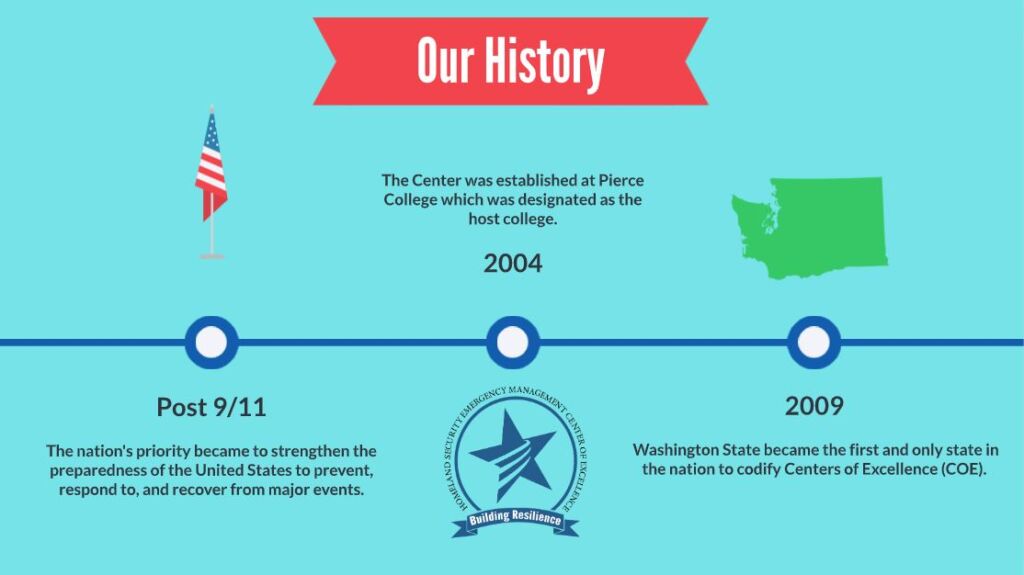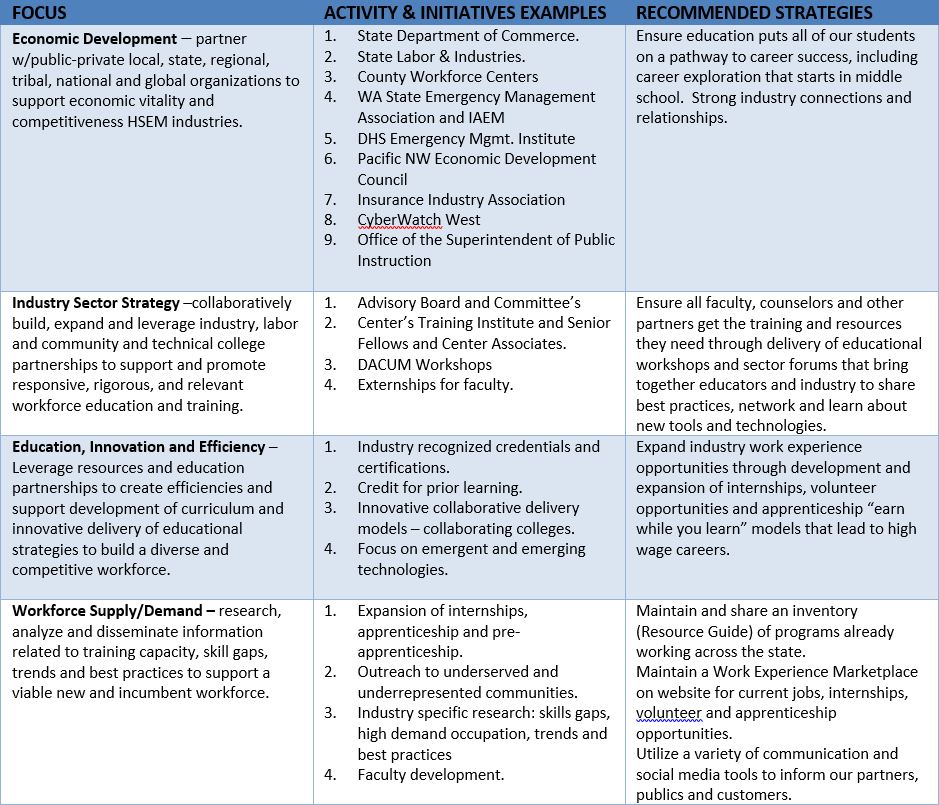HSEM Center – Our History

In the aftermath of 9/11, the Department of Homeland Security (DHS) developed standards for planning, responding to, and recovering from similar terrorist attacks. Through Homeland Security Presidential Directive 8 (HSPD-8) the National Incident Management System (NIMS) and the Incident Management System (ICS) was adopted. The intent was to create an ability to respond to an incident and to be able to communicate and work under one standard system. With 85% of first responders being trained in Community and Technical Colleges, the Center of Excellence for HSEM was established in September 2004.
OUR ROLE
The role of the Center has evolved over the years to provide effective leadership and coordination that rapidly responds to the interests of education institutions and employers in order to prepare a skilled workforce to help maintain our national security and ensure an effective response to all-hazard events through educational and training initiative.
The Center delivers training, exercises, and workshops statewide throughout the Community and Technical College system in collaboration with our community partners. Guided by our Advisory Board, public and private organizations and businesses, education and labor, the Center has delineated clear education and career pathways in HSEM and related fields to advance the state’s critical mitigation, preparedness, response, and recovery needs.
Response to COVID-19
Community colleges and universities across the state of Washington have all been impacted by the COVID-19 pandemic. For example, instructors were ordered to move their classes online so students could complete their course work. The transition of switching from a face-to-face setting to online teach¬ing has not been easy for some people, particularly those who have never taught online or taken online courses. The lack of experience with online can be both daunting and stressful for students and instructors.
Our Center’s Staff, Advisory Board Members, Senior Fellows and Volunteers helped with our COVID response. All of the all hazard emergency managers and responders who worked in our hospitals have saved thousands of lives, cared for and honored those who have passed, and to delivered necessary supplies and services to homes, businesses and communities. All hazard emergency personnel have worked tirelessly to help carry out the federal, state, local and nonprofit organizations plans and activities in our communities to help prepare them to survive emergencies and disasters which include pandemics.
Phillip Johnson, a Center Advisory Board Member from State Fish and Wildlife Regulatory Division, was assisting the Department of Health (D0H) as part of an interagency team of state agencies assisting DOH’s Shoreline IMT (Incident Management Team) to do their Epidemiology response work. Phil contacted our Center because of his involvement with our all-hazard emergency management program pathways to recruit interns and volunteers from our regional Criminal Justice Programs working with faculty, staff, and administration.
The Center contacted and worked with the Criminal Justice Workgroup (members representing all 20 CJ Programs statewide). These were unpaid internship or volunteer positions and the Workgroup members responded quickly to what they believed would be a fantastic learning opportunity and a huge service to Washington State and the community.
The CJ co-chairs and Center staff and volunteers worked not only with our Community College programs, but also with a number of four year colleges and Pierce College alumni to assist in this crisis. “I felt our workgroup was excellent at being flexible to the needs of DOH and worked beyond the scope of our duties in order to provide assistance during the initial COVID crisis. In doing so we created we networks for employment opportunities and work based learning,” said Bobi (Pierce College).
The Center coordinated all of the internship/volunteer applications for the participating CJ Workgroup members and Department of Health. Rolling internships started May 18th – through the summer. Internships will last for 6 weeks and have been expanded to meet other COVID response needs that DOH has. At last count, 20 students and volunteers were recruited and are working through the summer into the fall.
OUR MULTIMEDIA EXPANSION
The Center completed and launched its new website August 1: https://www.coehsem.com. A website for most of us is the single biggest and most significant thing we can do for our Centers of Excellence (COE). Websites need to not only look appealing, but must provide a seamless user experience for all visitors. Our goal was to have a well-planned and formatted site that is compatible with all mobile phones and accessible to all users. The site is functional, easy to use and navigate and includes relevant content to meet the needs of our users. The Center has established a “media station” to expand and facilitate our ability to communicate with our audiences in creating online podcasts, webinars, video interviews, and lectures for our audiences to view and participate in.
We are creating animated videos that are engaging our audiences in a variety of ways to share our content messages such our YouTube video which introduces our users to the Centers of Excellence; specifically our HSEM Center. The video is less than 3 minutes in length and we have distributed it widely. It has received excellent feedback from our viewers. https://www.youtube.com/watch?v=csZoNeMUAUw
Our monthly Confluence News Magazine shares information about our events and activities. The July 2020, which was just distributed https://www.coehsem.com/confluence-news/, includes the publication of our plans and goals for this year and all we did for our strategic planning with our Board, staff and Senior Fellows virtually over four (4) sessions. We developed an excellent template for our future virtual work with all of our constituencies.
Our Partners
To ensure it has the best practices and educational research available the Center maintains a strong relationship with both public and private partners at the local, state, regional, tribal and federal level including our K-12 and public and private colleges and universities.
We are members of the N. SF-ATE Cyber Watch West Consortium whose headquarters are located at Whatcom Community College, National Disaster Preparedness Training Centers at (NDPTC) at the University of Hawaii, and University of Texas A&M Engineering Extension Service (TEEX).
We maintain strong ties with our local, state, regional, tribal and federal government public safety, security, cybersecurity and emergency management organizations, Workforce Boards and Labor, other state agencies and non-profit organizations such as WIN 2-1-1, and international response organization such as World Vision and American Red Cross.
Our Structure
Centers of Excellence are funded through the State Board for Community and Technical Colleges (SBCTC) which reports to the Governor and Legislature.
• They are headquartered at a CTC college selected by the State Board and college leadership.
• They serve statewide as a point-of-contact and resource hub for industry trends, best practices, innovation curriculum and professional development opportunities for colleges and industry.
• They bring together workforce and industry partners in order to develop highly-skilled employees for targets industries.
HSEM Center regionalized its staffing in 2015. HSEM Center recognizes our service area is large and has specific regional needs. We established three (3) Regional Education and Outreach Coordinator positions for NW Washington, SW WA and Olympic Peninsula, and Eastern WA. HSEM Program and Website Management and Media Specialist are responsible for supporting our many training, education and outreach projects.
Our Service Focus
We collaborate with leaders in the all-hazard Emergency Management fields of Public Health and Safety, Security, Cybersecurity, Law Enforcement, Fire and Emergency Health, Medical, Communication and Management. We have subject matter experts on our industry advisory board and as Senior Fellows and Associates which gives us access to regional and national curriculum. Education and industry leaders share their accomplishments and ongoing challenges through a variety of interactions.

Website, News Briefs and Special Reports
Center’s convenient website www.coehsem.com provides local, state and national resources and information on our six industry clusters. Confluence Media serves as an intersection where we share events, interests, and important information about our Center and the state’s all-hazard emergency management pathway programs. Our news magazine shares events and activities of our Center each month. Our video and podcasts discuss a variety of issues,
interests, trends and discussion about our career pathways.
We focus on providing access for students and the industry workforce to industry news through our Work Experience Marketplace and our Career Pathways Program Guide. It provides updated information on our CTC training, education programs, trends and career research, information on our state’s K-12 systems of Skills Centers, colleges and universities and resources available for our veterans, women, and gives a foundation for relevant Bachelors of Applied Science and master’s degrees offered in the region. The Program Guide is available online and can be downloaded for a print version.
Our Special Reports Section provides education leaders with research-based content that includes perspectives from industry experts and public-sector peers. We provide current thinking, best practices, tips for successful program implementation and professional development guidance, access and dissemination of
industry news via eNews and Bulletins, website and social media.
Strategic Conversations – Strategy Reports – Issue Briefs
Roundtables are a series of gatherings with key career cluster educators, practitioners and industry leaders to focus on education and training needs, trends and
identify needs and other issues. Securing the Supply Chain Forums are examples what types of education and training needs exist and what types of curriculum and programs may be needed in the future. These Special Reports from subject matter experts answer key questions about emerging issues and are shared through a variety of media.
Industry and Education Events
The Center brings together educators and their students, practitioners and industry experts at statewide and regional events. Designed to encourage interaction, meaningful discussions and sharing best practices, and professional development, our events offer time for networking, building relationships and launching
partnerships.
Program Reviews
The Center facilitates reviews and assessments on HSEM career cluster programs and curriculum, both current and proposals for new programs including types of degrees, programs, courses, delivery methods, and faculty that teach in these areas. Reports provide recommendations on how programs and curriculum can improve the availability, access, quality, and knowledge/skill areas in all-hazard HSEM education cluster within the CTC system. The Center works with industry professionals to review program degrees and certificates that are in place each year including proposals for applied baccalaureate degrees. Programs may request reviews and receive customized reports.
Handbooks & Guidelines – Technical Assistance – Training Institute
Provides education decision makers with guidance on a variety of education areas, processes and best practices related to important workforce needs. Our website’s Preparedness Section provides access to resources, training and education to help a college and community to prepare its citizens, local community organizations, agencies and business and industry to respond and recover from all-hazard events. Our guides and handbooks section on our website includes our guides developed such as Pathway Resource Guidebook, Pathways Mapping , Crosswalk Development – Deep Dive and our guide which was developed to help our CTC colleges develop innovative collaborations and sharing of curriculum and programs called “Guide to Establishing Online Program Collaboration”.

